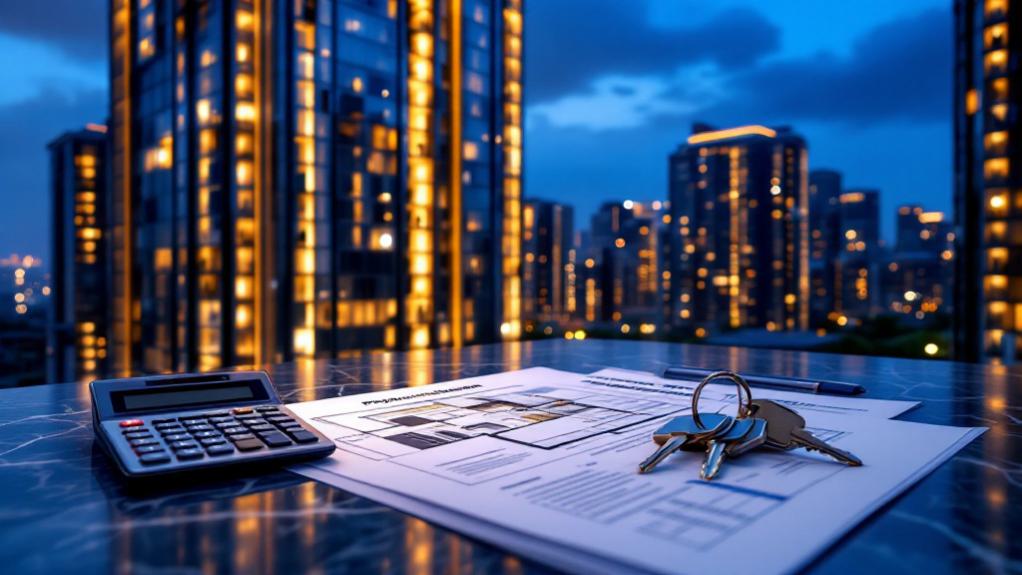Property valuation in Singapore employs multiple methodologies including Comparative Market Analysis, Income Capitalization, and Residual Method to determine fair market value. Professional valuers from the Singapore Institute of Surveyors and Valuers consider critical factors such as location, property specifications, economic conditions, and rental potential during assessment. Valuations are essential for mortgage applications, taxation, and investment decisions, with resources from HDB and URA supporting the process. The thorough analysis navigates challenges of limited land supply and evolving government policies within Singapore’s dynamic real estate market.

Nearly every notable property transaction in Singapore relies on a critical, yet often misunderstood process: property valuation. This systematic estimation of a property’s fair market value, conducted by professional valuers or appraisers, serves multiple essential functions in Singapore’s dynamic real estate market, including facilitating mortgage applications, determining property tax obligations, and guiding investment decisions.
Several methodologies govern property valuation in Singapore’s diverse real estate landscape. The Comparative Market Analysis approach examines recent transactions of similar properties to establish benchmark values, while the Income Capitalization Method, particularly relevant for commercial properties, calculates value based on potential rental income. The Residual Method, Cost Approach, and Profits Method constitute additional frameworks applied according to property type and specific circumstances.
Singapore’s property valuation employs diverse methodologies tailored to each real estate segment, ensuring accurate market value determination across different property types.
Property valuation in Singapore reflects numerous interconnected factors that influence market value. Location and accessibility remain paramount considerations, alongside property specifications such as size, condition, and age. Economic conditions, market trends, and rental income potential further modulate valuation outcomes, creating a complex matrix of value determinants. Professional appraisers provide the most accurate valuation by conducting in-depth analysis of all these factors beyond what basic online tools can offer. Investors should pay special attention to the three main regions—Core Central Region, Rest of Central Region, and Outside Central Region—as property values can vary significantly across these geographical areas.
Licensed professionals from the Singapore Institute of Surveyors and Valuers conduct these valuations through rigorous site inspections and market research. For residential properties, valuers reference HDB’s Resale Flat Prices e-service for public housing and URA’s Private Residential Property Transactions database for private properties, with banking institutions typically engaging third-party valuers for mortgage purposes. These assessments directly influence the Loan-to-Value ratio which determines how much financing a buyer can secure against the property.
Commercial property valuation frequently employs the Income Capitalization Method, analyzing rental income, occupancy rates, lease structures, and operating costs. The valuation must account for tenant quality and potential redevelopment opportunities that could affect future income streams.
Singapore’s unique property market presents distinct valuation challenges, including rapidly changing market conditions, limited land supply, and government policy interventions that considerably impact property values. The distinctive characteristics of individual properties often complicate comparative analysis, necessitating regular revaluation to maintain accuracy in this fluctuating market environment.
Frequently Asked Questions
How Do Historical Property Transactions Impact Current Valuation Estimates?
Historical property transactions serve as critical benchmarks for current valuation estimates, with valuers typically analyzing data from the past 3-6 months to establish reasonable market values.
Recent comparable sales receive greater weighting, while URA records, HDB indices, and banking databases provide longitudinal perspectives on pricing trends.
The relevance of historical data, however, diminishes when market dynamics shift rapidly or when properties possess unique characteristics not captured in standard transaction records.
Can Property Valuation Be Challenged if I Disagree With the Assessment?
Property owners can challenge their valuation assessments through a structured appeal process, which must be initiated within 30 days of receiving the valuation notice.
Appellants must submit substantial evidence supporting their claim, such as measurement discrepancies, overlooked property features, or comparable sales data.
While the burden of proof rests with the property owner, successful appeals, which average 20-30% success rates, may result in retroactive adjustments after the typical 4-6 month processing period.
How Does Property Valuation Differ Between HDB Flats and Private Condominiums?
Property valuation differs markedly between HDB flats and private condominiums through distinctive methodologies and influencing factors.
HDB valuations are government-regulated with subsidized land costs and MOP restrictions, while condominium valuations follow market forces, incorporating facilities, en bloc potential, and foreign buyer accessibility.
Though both utilize direct comparison methods, condominiums experience greater price volatility and economic sensitivity, with valuations varying considerably within developments.
HDB prices remain comparatively stable due to government policies and limited buyer eligibility.
What Credentials Should a Professional Property Valuer in Singapore Possess?
Professional property valuers in Singapore must possess a bachelor’s degree in real estate or related fields from accredited institutions such as NUS or NTU.
Credentials include Chartered Valuer and Appraiser (CVA) certification from IVAS, Licensed Appraiser status from IRAS, and membership in the Singapore Institute of Surveyors and Valuers (SISV).
A minimum of three years’ practical experience across diverse property types, coupled with continuous professional development, guarantees compliance with international valuation standards.
How Do Seasonal Market Fluctuations Affect Property Valuation Results?
Seasonal market fluctuations greatly impact property valuation results through cyclical patterns in Singapore’s real estate ecosystem.
Q2 and Q3 typically yield higher valuations due to increased sales volumes, while Chinese New Year periods demonstrate temporary slowdowns.
Valuers must adjust for these seasonal variants by employing longer-term data analysis, year-on-year comparisons, and multiple valuation methodologies.
Recent comparable sales, heavily influenced by seasonal factors, require careful normalization to deliver accurate, market-reflective valuations despite temporal market sentiment fluctuations.





